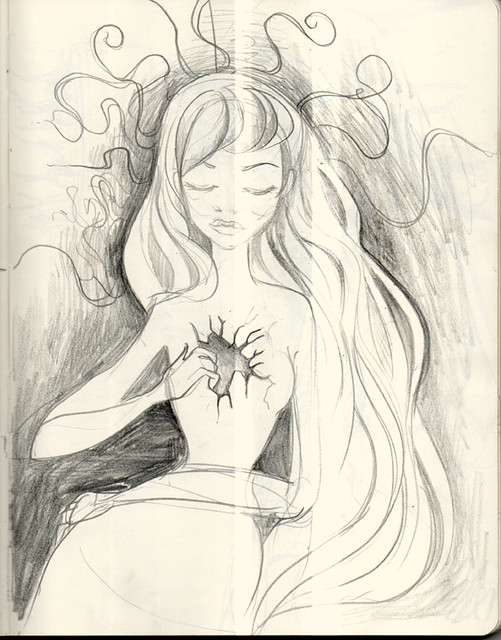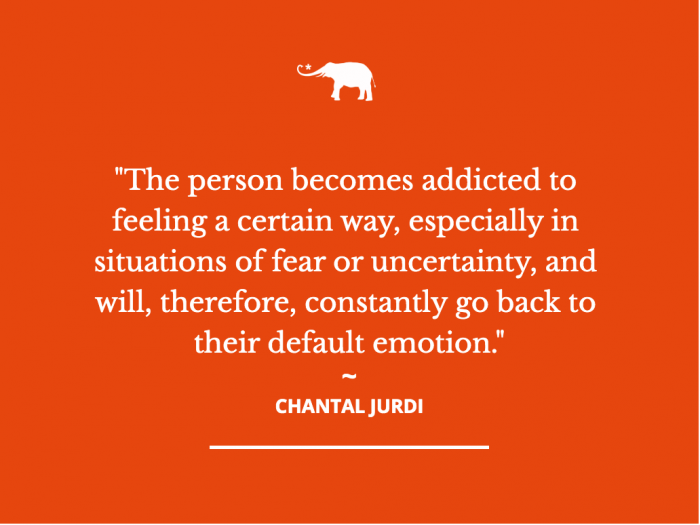My journey toward self-love has never been a straight path.
Coming from a background where emotions were taboo, I struggled all of my adult life with my feelings—how to understand them, honor them, tame them, and then let them go. And let me tell you, at times, I felt like it was a full-time job.
One night, while I was mindlessly sitting on my bed, scrolling through my Instagram feed, my attention was caught by the words “emotional addiction,” and I instantly knew that I was on to something. Trying to make sense of the rush of thoughts running through my head, I rapidly clicked on the image. And what I read next actually changed the course of my life.
What is emotional addiction?
Emotional addiction is a state where the addict is dependent, as the name indicates, on their emotions. Or more precisely, on the chemicals produced by the brain when particular emotions are triggered, better known as “hit emotions.”
The person becomes addicted to feeling a certain way, especially in situations of fear or uncertainty, and will, therefore, constantly go back to their default emotion—a mechanism that gives them a sense of familiarity.
Emotional addiction manifests in the lives of the addict in a series of typical behavior, such as constant venting, the need to relive negative experiences, and unconsciously seeking relationships and situations that activate their hit emotions by triggering feelings of uncertainty and abandonment.
This hit so close to home that I spent the rest of the night searching for everything that I could find on the subject, and here is what I discovered.
Where does emotional addiction come from?
Emotional addiction stems from childhood trauma and is usually the manifestation of unmet emotional needs. While I was growing up, talking about, dealing with, and managing my emotions was a completely foreign notion. No one around me was really equipped to handle their own feelings, let alone deal with mine. So, with time, I became an expert at hiding my emotions, by discarding them as something to ignore at best or be ashamed of at worst.
This toxic coping mechanism served me well into adulthood, until one day, it completely blew up in my face and landed me in the hospital. I realized then and there that I could no longer carry on like that; I needed to face my demons no matter how painful. This was the only way to move forward, and so I started the long process of my healing journey.
But somewhere along the way, I lost myself again and went from completely ignoring my emotions to making everything in my life about them. Being deprived of something for so long can make us obsessed with it once we discover it. And that is exactly what happened to me.
As I was beginning to heal, and without realizing it, everything in my life became about how I felt. Before I knew it, I was functioning depending on my emotions and was constantly overwhelmed. I was also perpetually chasing happy feelings by trying to avoid bad ones at all costs, and when all else failed, I had the comfort of going back, time and time again, to my familiar hit emotion.
Needless to say, I was stuck in an endless cycle of unnecessary pain—one I was desperately trying to get out of.
Here are nine ways I have compiled on how we can break free from emotional addiction:
1. Identify your “hit emotion.” Emotional addicts are usually dependent on a particular feeling. My hit emotion, for instance, was outrage. I was constantly looking for ways to justify my outrage by overanalyzing everything and everyone around me. And it was exhausting.
2. Talk to a trusted friend, partner, or family member. They can be crucial in helping us shed light on a particular behavior we were constantly perpetuating. Ask them if they have noticed any recurrent emotion or reaction. Having a caring second opinion can be a mirror into our souls and a fresh outsider’s perspective.
3. Journal and meditate to identify triggers and patterns. Whenever we are feeling bad, turning to journaling or meditation can be healing. It can help us understand what triggered our emotions and see if there are any emerging patterns, which will, in turn, activate the healing process.
4. Identify who in your circle is triggering this pattern. In my case, it was a close friend I had on speed dial. I had the convulsive and recurrent need to constantly vent to her whenever things went wrong, which was on a quasi-daily basis. But the truth about venting is that it usually makes you relive the negative experience without adding any positive outcome to the situation. You then wind up more frustrated than you were to begin with, not to mention feeling guilty for sharing annoying, sometimes intimate matters.
5. Understand that it takes time. Healing from emotional trauma is a long journey full of ups and downs. It takes time, no matter how committed we are. Answers about our emotional and psychological well-being may come in layers and bits of pieces. It took me almost 10 years of working on myself on a daily basis and a myriad of experiences and realizations to come to that particular one. Discovering we’re emotional addicts is never easy, so it’s better to be patient with ourselves.
6. Know that you might relapse. When trying to change a habit that has been ingrained in us for a long period of time, the brain might resist, since it doesn’t like change. Knowing that fact will allow us to be gentle with ourselves if we do relapse. It will also allow us to understand what is going on with us and make us better equipped to deal with it.
7. Rest, exercise, and energize—whenever possible. We are doing tremendous conscious and unconscious work, and we need to have the proper nutrients, energy, and rest in order to keep going.
8. Reframe your brain by honoring your emotions. We are allowed to feel them, so it is crucial to understand why we are feeling them, then honor and validate them by telling ourselves that it is okay. We are entitled to our feelings. And this is the stage where I would usually stop. By being focused on my emotions all the time and not taking a step back to align my emotions with my logic, I easily became vulnerable and overwhelmed, especially when I was feeling bad. That is why it is crucial to:
9. Remind ourselves that they are just emotions. And that they do not define us. They are part of who we are and part of our journey, but they aren’t us, just like our thoughts aren’t us.
Emotional addiction is way more subtle than any other form of addiction. In some societies and cultures, it is even considered normal behavior, and that is why it is so much harder to spot. But like any type of dependency, it can make us feel stuck in an endless cycle of unnecessary pain.
Therefore, being gentle with myself, listening, and honoring my needs was the first step in my recovery. It was also crucial for me to realize that although emotions are important, they shouldn’t be the sole motivators of my life. They have to be aligned with everything that makes me whole, such as my logic, my intuition, and my sense of self.
It is only when I learned to fully manage my emotions and give them back the place they deserve, that I was able to break free and lead the life that I have always wanted.
~


 Share on bsky
Share on bsky






Read 0 comments and reply